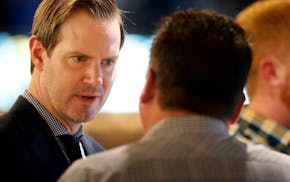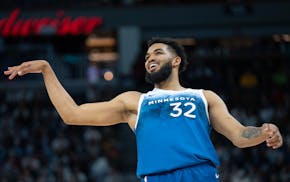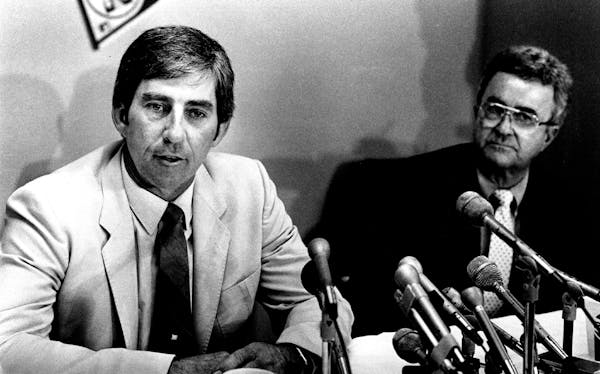Ray Miller was sitting in the visitors dugout at Riverfront Stadium in Cincinnati during the 1990 NLCS. He was a lone figure as he enjoyed a cool and refreshing midafternoon cigarette.
The rotund figure of a man carrying a notebook approached. Miller offered a slight look of distaste that clearly wasn't because of the cigarette. Ray loved those.
This chubby Twin Cities sportswriter and "The Rabbit" (Ray's wonderful and mysterious nickname) did not get along swimmingly back in the summer of 1986. Ray was on his way to getting fired as Twins manager, an event that came with the scribe's full endorsement.
Ray seemed conflicted as to whether he should tell the ink-stained wretch — OK, it was me — to take a hike, or to give into his always strong urge to talk.
Paul Meyer, a Pittsburgh baseball writer, had Miller as the Pirates pitching coach for a decade. And to Paul, he was "Topper," not Rabbit.
Why? "No matter what story he hears, Ray's going to top it," Meyer said.
There was no taleteller to be topped, just the two of us, and I opened with, "How is your life, Ray?"
He responded: "What? My life is good now. Minnesota was a learning experience. I learned not to take anything for granted."
Miller died this week. Our reunion mentioned above was in October 1990 and Pittsburgh, with Miller as manager Jim Leyland's pitching coach, held a 1-0 lead over Cincinnati in the NLCS. The Reds would come back to win the series 4-2, then sweep Oakland in a World Series upset.
Miller's first managerial shot had come through Howard Fox. Longtime loyalist to his boss, Calvin Griffith, Fox transformed himself into Carl Pohlad's shadow in the months leading to Carl's deal in the summer of 1984 to purchase the Twins.
Fox became team president and decided to put his stamp on the baseball operation in 1985 by firing Billy Gardner as manager and replacing him with Miller, then Baltimore's pitching coach, on June 21.
The Twins were 27-35 when Gardner was fired, and Miller went 50-50 the rest of the way. One move to improve the situation came on Aug. 1, when the Twins acquired pitcher Bert Blyleven from Cleveland, nine years after Blyleven had departed Minnesota in a salary and personal feud with Griffith.
The next move to shore up the pitching didn't quite work out: The Twins signed Steve Howe on Aug. 12, five weeks after the cocaine addict was released by the Dodgers.
One month later, the Twins were completing a series in Chicago. Howe was given permission to travel to Cleveland the next day to appear on "Nightline" that night to talk about his recovery.
He did that, promptly went on a cocaine binge and didn't make it to Cleveland.
Howe was finally found and dropped by the Twins on Sept. 17.
Rabbit's .500 record over the last 100 games offered a tad of optimism for 1986. By then, young executive Andy MacPhail was more prominent, although not yet officially in charge of the baseball operation.
The Twins flopped. They were 59-80 on the morning of Sept. 12 and, at MacPhail's urging, Miller was fired and replaced by third base coach Tom Kelly, who went 12-11 the rest of the season.
It took until late November for MacPhail to officially become the baseball boss, and for Pohlad to give in to Andy's push for Kelly to go from interim replacement to manager.
Four years later, Rabbit was sitting in the dugout in Cincinnati, with his own reality as to how the Twins were able to win the World Series in his first year gone, and as to the villain in his mind — Fox — not the exec that really wanted him gone, MacPhail.
Miller said Fox would not heed his call to look at young pitching and they exchanged insults. Fox would not get a leadoff hitter, a closer and other bullpen help.
What happened in 1987, Rabbit said, was MacPhail was the general manager, and he brought in Dan Gladden to lead off and Jeff Reardon and Juan Berenguer for the bullpen … pretty much his recommendations that Fox ignored.
Miller also said he was a driving force in working with Gary Gaetti on how to look for the breaking ball, urged Kirby Puckett to stand closer to the plate to hit for power and convinced the Twins that Greg Gagne and Steve Lombardozzi had to be the middle infielders, not the less-athletic Roy Smalley and Tim Teufel.
"I feel good about a lot of the things we implemented in Minnesota," Miller said. "The way I feel, the changes we made had something to do with what happened the next year."
The Rabbit's fondness for conversation definitely blew away perceived wrongs that fall day in Cincinnati, which was the outcome anticipated while trudging toward him, fresh ballpoint at the ready.

Reusse: Success on court helped Timberwolves do strong business

Reusse: Taylor's story. 'I just bought the Minnesota Timberwolves.'

Reusse: Back from injury, Towns doesn't have to carry load


